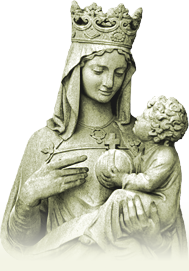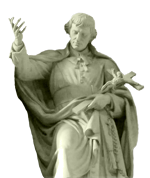Church
There is no salvation outside the Church
Marcelo de Andrade
In these times of religious syncretism, much has been spoken about liberty of religion, cult and creed, and about salvation outside the Church. This is the ecumenism, professed everywhere. But, let us see what the Catholic Church has to say about it, by means of her infallible magisterial. Because much has been spoken about, but little has been studied.
Let us start with the Bible:
Exodus XX, 3: “Thou shalt not have strange gods before me.”According to the Old Testament there is only one true God, that is the one of Israel. All the others are devils: Brahman, Shiva, Vishnu, Alah, Moloch, Zeus, Apollo, Mercury, Manitou, etc.
Exodus XXII, 20: “He that sacrificeth to gods, shall be put to death, save only to the Lord.”
Exodus XXII, 18: “Wizards thou shalt not suffer to live.”
Psalms XCV, 5: “For all the gods of the Gentiles are devils.”
Isaias XLIV, 6: “Thus saith the Lord the king of Israel, and his redeemer the Lord of hosts: I am the first, and I am the last, and besides me there is no God.”
Isaias XLV, 21-22: “...A just God and a saviour, there is none besides me. Be converted to me, and you shall be saved, all ye ends of the earth: for I am God, and there is no other.”
The examples given by Moses, and mainly by Elias, two of the greatest saints in history, are in this sense, anti-ecumenical:
Moses destroyed the golden calf, made by the Israelites while he was at Mount Sinai: “And laying hold of the calf which they had made, he burnt it, and beat it to powder...” (Exodus XXXII, 20). Thereafter, Moses punished those guilt for that: “...and there were slain that day about three and twenty thousand men.”(Exodus XXXII, 28)
Elias invited the priests of Baal for a duel: they would go to the Mount Carmel and would invoke Baal, while Elias would pray to the God of Israel, to send a fire from the sky, in order to consume the victim offered in sacrifice. Whoever did that would be the true God.
At the designated mount, Baal did not appear, and Elias jested and said to them: “Cry with a louder voice: for he is a god; and perhaps he is talking, or is in an inn, or on a journey; or perhaps he is asleep, and must be awaked.” (III Kings, XVIII, 27)
The true God appeared and consumed the victim. The priests of Baal, by seeing their defeat, were preparing to evade, but Elias did not permit so: “Take the prophets of Baal, and let not one of them escape. And when they had taken them, Elias brought them down to the torrent Cison, and killed them there.” (III Kings, XVIII, 40)
In the New Testament we have the confirmation that there is only one true God. And it then is founded the one true Church...
Saint Mathew IV, 8-10: “Again the devil took him up into a very high mountain, and shewed him all the kingdoms of the world, and the glory of them, And said to him: All these will I give thee, if falling down thou wilt adore me. Then Jesus saith to him: Begone, Satan: for it is written: The Lord thy God shalt thou adore, and him only shalt thou serve.”
Through the text we reach two conclusions:
All the kingdoms of the world served Satan.
One can only adore one sole God.
Saint John VI, 68: “Lord, to whom shall we go? Thou (Jesus) hast the words of eternal life.”
Acts IV, 12: “Neither is there salvation in any other. For there is no other name (Jesus) under heaven given to men, whereby we must be saved.”
I Cor. X, 19-22: “Or that the idol is any thing? But the things which the heathens sacrifice, they sacrifice to devils and not to God. And I would not that you should be made partakers with devils. You cannot drink the chalice of the Lord and the chalice of devils: you cannot be partakers of the table of the Lord and of the table of devils.”
Throughout the history of the Church, there has always been the dogma that there is only one true Church, outside of which there is no salvation. That being so, there is no such thing as liberty of religion, creed or cult. Let us take a look at these teachings:
Saint Cyprian (3rd century): “There is no salvation outside of the Church”.Let us see what the greatest Pope of the century, Saint Pius X, has to say (1903-1914) about the matter, he who has the authority of the popes and the virtue of the saints. Maybe he would be the best person, in the century, to talk about it. He made the so-called Major Catechism, in 1905. The first Catechism was ordained by the Council of Trent, and was published by Pope Saint Pius V, in 1566, and it is a summary of all the main doctrine always taught by the Church, organized in simple way, so that everyone can understand and obey it.
Creed of Saint Atanasius (4th century), official creed of the Catholic Church: "Whoever will be saved, before all things it is necessary that he hold the Catholic Faith. Which Faith except everyone do keep whole and undefiled, without doubt he shall perish everlastingly (...) This is the Catholic Faith, which except a man believe faithfully, he cannot be saved.”
The Pope Innocent III (1198-1216): “With our hearts we believe and with our mouths we confess one only Church, which is not of heretics, just the Saint, Roman, Catholic and Apostolic, outside of which we believe that no one can be saved”.
IV Lateran Council (1215), infallible, Canon I: “There is indeed one universal church of the faithful, outside of which nobody at all is saved...”. Canon III: “We excommunicate and anathematize every heresy raising itself up against this holy, orthodox and catholic faith which we have expounded above...”
Pope Boniface VIII (1294-1303): “For attachment to Faith, we ought to believe and sustain that there is only one Saint Catholic Church and the same apostolic and we firmly believe and simply confess that outside her there is no salvation nor absolution of sins. (...)Roman Pontiff, we declare, decide, define and pronounce it as of whole necessity for the salvation of all human creature.”
Council of Florence (1438-1445): “... firmly believes, professes and preaches that none of those existing outside the Catholic Church, not only pagans, but also Jews, heretics, and schismatics can ever be partakers of eternal life, but that they are to go into the eternal fire ‘which was prepared for the devil and his angels,’ (Mt. 25:41) unless before death they are joined with Her(...)”
The infallible Council of Trent (1545-1563) besides condemning and excommunicating Protestants, it also reiterated everything that was declared in previous Councils proclaiming: “...our catholic faith, without which is impossible to please God...”
Pope Pius IV (1559-1565), one of the popes of the Council of Trent:”... This true Catholic faith, outside of which no one can be saved...” (Profession of faith of the Bull “Iniunctum nobis”, 1564)
Pope Benedict IV (1740-1758): “This faith of the Catholic Church, outside of which no one can be saved...”
Pope Gregory XVI (1831-1846), Mirari Vos: “Now We consider another abundant source of the evils with which the Church is afflicted at present: indifferentism. This perverse opinion is spread on all sides by the fraud of the wicked who claim that it is possible to obtain the eternal salvation of the soul by the profession of any kind of religion, as long as morality is maintained. Surely, in so clear a matter, you will drive this deadly error far from the people committed to your care. With the admonition of the apostle that "there is one God, one faith, one baptism"(Ephesians 4,5) may those fear who contrive the notion that the safe harbor of salvation is open to persons of any religion whatever. They should consider the testimony of Christ Himself that "those who are not with Christ are against Him," (Luke 11,23) and that they disperse unhappily who do not gather with Him. Therefore "without a doubt, they will perish forever, unless they hold the Catholic faith whole and inviolate." (Symbol of Saint Athanasius) (...) This shameful font of indifferentism gives rise to that absurd and erroneous proposition which claims that liberty of conscience must be maintained for everyone. It spreads ruin in sacred and civil affairs, though some repeat over and over again with the greatest impudence that some advantage accrues to religion from it. "But the death of the soul is worse than freedom of error," as Augustine was wont to say (Epistle 166)”
Thesis condemned by Pope Pius IX (1846-1878), in the Syllabus:
15o – “Every man is free to embrace and profess that religion which, guided by the light of reason, he shall consider true.”
16o – “Man may, in the observance of any religion whatever, find the way of eternal salvation, and arrive at eternal salvation.”
17o – “Good hope at least is to be entertained of the eternal salvation of all those who are not at all in the true Church of Christ.”
18o – “Protestantism is nothing more than another form of the same true Christian religion, in which form it is given to please God equally as in the Catholic Church.”
21o – “The Church has not the power of defining dogmatically that the religion of the Catholic Church is the only true religion.”
Another text from Pius IX (Quanta Cura): “(...)not fear to foster that erroneous opinion, most fatal in its effects on the Catholic Church and the salvation of souls, called by Our Predecessor, Gregory XVI, an "insanity,"(Mirari Vos)., that "liberty of conscience and worship is each man's personal right, which ought to be legally proclaimed and asserted in every rightly constituted society; (...) Therefore, by our Apostolic authority, we reprobate, proscribe, and condemn all the singular and evil opinions and doctrines severally mentioned in this letter, and will and command that they be thoroughly held by all children of the Catholic Church as reprobated, proscribed and condemned.”
Pope Leo XIII (1878-1903), encyclical Libertas Praestantissimum: “(...) offering man the freedom (of cult) which we spoke about, means giving him power to corrupt or abandon unpunished the holiest of the duties, keeping him off from immutable good, in order to turn towards evil. This, we already said, is not freedom, it is slavery of the soul in the objection of sin.”
Pope Pius XI (1922-1939), Mortalium Animus: “Certainly such attempts can nowise be approved by Catholics, founded as they are on that false opinion which considers all religions to be more or less good and praiseworthy, since they all in different ways manifest and signify that sense which is inborn in us all, and by which we are led to God and to the obedient acknowledgment of His rule (...)Those, who are unhappily infected with these errors, hold that dogmatic truth is not absolute but relative, that is, it agrees with the varying necessities of time and place and with the varying tendencies of the mind, since it is not contained in immutable revelation, but is capable of being accommodated to human life (...)For authors who favor this view are accustomed, times almost without number, to bring forward these words of Christ: "That they all may be one.... And there shall be one fold and one shepherd,"(John XVII,21;X,16) with this signification however: that Christ Jesus merely expressed a desire and prayer, which still lacks its fulfillment. For they are of the opinion that the unity of faith and government, which is a note of the one true Church of Christ, has hardly up to the present time existed, and does not to-day exist (...)(they claim) that these all (churches) enjoy the same rights; and that the Church was one and unique from, at the most, the apostolic age until the first Ecumenical Councils (...)This being so, it is clear that the Apostolic See cannot on any terms take part in their assemblies, nor is it anyway lawful for Catholics either to support or to work for such enterprises; for if they do so they will be giving countenance to a false Christianity, quite alien to the one Church of Christ.”
“Catechism of the Christian Doctrine”, infallible voice of the teachings of the Popes and the Councils:Yet, in another document, Saint Pius X, on condemning the modernist thesis: “All religions, not even excepting those of the idolaters, must be taken as truthful (...) And the modernists, in fact, do not deny this, otherwise, they affirm, some confusingly, others manifestly, that all religions are truthful (...) At the most, in the struggle among the several religions, the modernists could sustain that the Catholic Church have more truth, because it is more vivid and deserves more the title of Christian, because it more completely corresponds to the title Christian, because it more completely corresponds to the origin of the Christianity.
149 – What is the Catholic Church?
The Catholic Church is the society or the reunion of all baptized people which, living on earth, profess the same faith and the same law of Christ, and take part of the same sacraments, and obey the legitimate pastors, mainly the Roman Pontiff.
153 – So, does not belong to the Church of Jesus Christ the societies of baptized people which does recognizes the Roman Pontiff as their leader?
Everyone who does not recognize the Roman Pontiff as his leader is not part of the Church of Jesus Christ.
156 – Could there be not more than one Church?
There cannot be more than one Church, because, as there is only one God, only one faith and only one Baptism, so also there is not neither there can be but one only true Church.
168 – Can somebody be saved outside the Catholic Apostolic Roman Church?
No. Outside the Catholic Church, Apostolic, Roman, nobody can be saved, as nobody could be saved from the flood outside Noah’s Ark, which was a figure of this Church.
We believe to have proved that, by the Catholic Church: there is only one truthful Church, outside of which there is no salvation;
Besides that, as there is only one God, consequently, there can be only one true Church.
These propositions remain forever.
Para citar este texto:
"There is no salvation outside the Church"
MONTFORT Associação Cultural
http://www.montfort.org.br/eng/veritas/igreja/foradaigreja/
Online, 29/12/2025 às 01:25:01h








